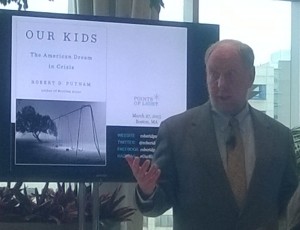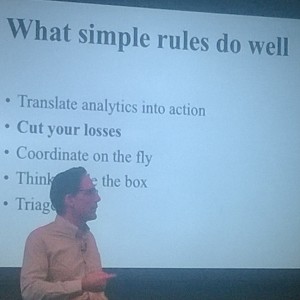This year’s annual meeting of the Points of Light Corporate Service Council took place in the Boston offices of John Hancock. More than 75 companies were represented at the two day convening. Topics ranged from Innovation and Social Change to What is the Impact of Social Impact Measurement. We had presentations by two of the nation’s leading scholars and authors, Robert Putnam of Harvard and Don Sull of the London Business School and MIT.
 Robert Putnam spoke of his new book, Our Kids: The American Dream in Crisis. A brilliant account of the roots of the growing income inequality. It discusses the real societal and economic costs, costs that need to be addressed to keep the country vibrant and able to compete properly on the world stage.
Robert Putnam spoke of his new book, Our Kids: The American Dream in Crisis. A brilliant account of the roots of the growing income inequality. It discusses the real societal and economic costs, costs that need to be addressed to keep the country vibrant and able to compete properly on the world stage.
Among Putnam’s key findings:
- While there’s been much discussion in recent years about America’s income inequality, we should brace ourselves for growing inequality of opportunity in coming decades. “
- The American Dream is increasingly out of reach for lower income students.
Closely calculated estimates of the aggregate economic costs of the widening opportunity gap—in terms of crime and law enforcement, of public health, and above all of lower labor productivity—are massive: $500 billion per year or roughly $6 trillion in present value over the lifetimes of the current cohort of disadvantaged kids. - There are many growing gaps between the opportunities facing poorer kids (parents with a high school degree or less) and richer kids (parents with a BA or more). Poorer kids get less “Goodnight Moon” time, have fewer family dinners, participate less in sports or other extracurricular activities, attend church less than their richer peers, and are more likely to be obese and inhale more second-hand smoke—each of these gaps has widened in recent years. Richer kids increasingly grow up in two-parent households with fewer economic worries, get high quality daycare, and trust their neighbors more than their poorer counterparts.
- Familial and community resources and supports are increasingly available only to richer kids, as middle and upper class families deploy “air bags” to cushion their children from stressful or traumatic experiences or from mistakes they have made. Poorer families often don’t have the resources to deploy such “air bags” to minimize the negative consequences of childhood misadventures or family or economic changes. Growing up is about learning from mistakes, but the mistakes are relatively costless for affluent kids and often derail poorer kids from the path of success.
- Parents of both rich kids and poor kids want their children to succeed, but the parents of the rich kids typically know how to achieve this, while the parents of poor kids often do not.
- The Internet seems more likely to widen the opportunity gap than to close it. Affluent Americans use the internet in ways that are mobility-enhancing, whereas poorer, less educated Americans use it in ways that are primarily entertaining.
Lower class kids are less trusting than their upper class counterparts, because their social environment is pervasively less trustworthy.
 Don Sull’s decade long study shows that most successful companies don’t try to deal with complex issues with complex solutions. Most manage complexity with simplicity. His new book, simple rules: how to survive in a complex world, is co-written with Kathy Eisenhardt of Stanford,. People tend to check out when solutions to problems become too complex. Develop a framework, not an algorithm, as it leaves scope for initiative, creativity, experience and expertise.
Don Sull’s decade long study shows that most successful companies don’t try to deal with complex issues with complex solutions. Most manage complexity with simplicity. His new book, simple rules: how to survive in a complex world, is co-written with Kathy Eisenhardt of Stanford,. People tend to check out when solutions to problems become too complex. Develop a framework, not an algorithm, as it leaves scope for initiative, creativity, experience and expertise.
Both books are a must read. My take-a-way words from this convening are from Paul Burton, a reporter for WBZ-TV News and director of the Ron Burton Training Village, a youth sports camp founded by his father. “Dream big, but act now.”
